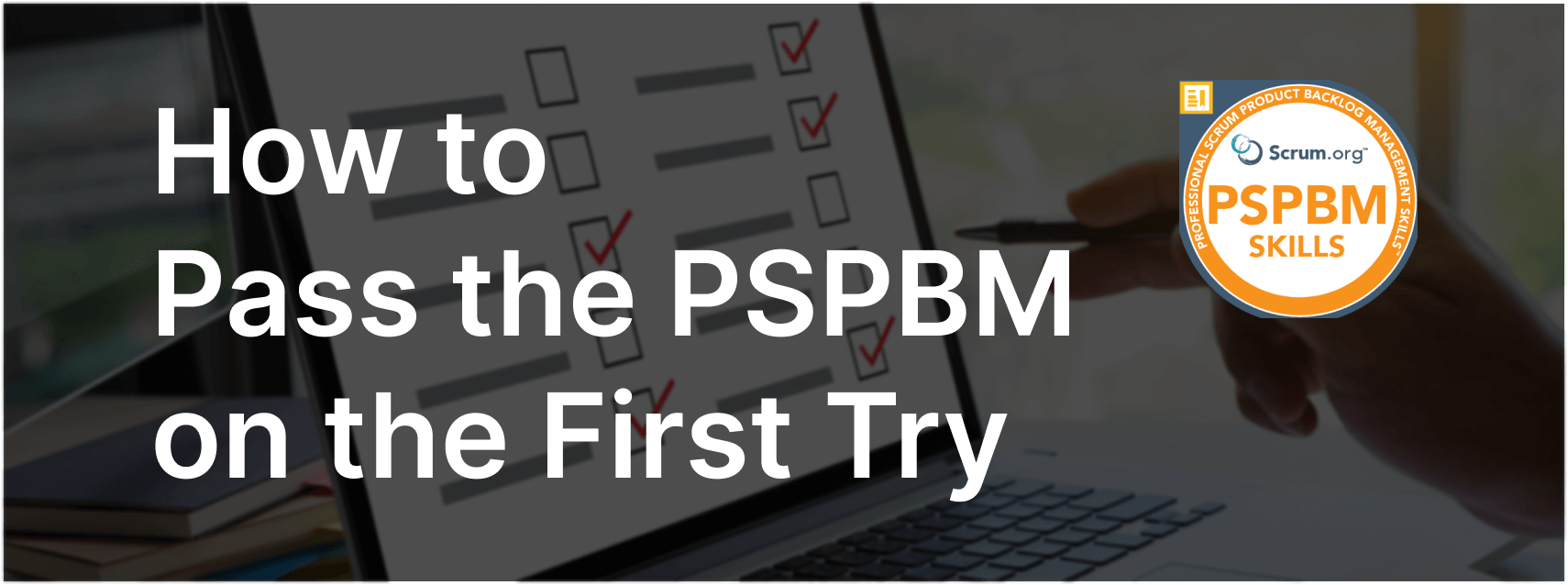The Professional Scrum Master III (PSM III) exam is a challenging assessment that requires a deep understanding of the Scrum framework and its application in real-world scenarios. In this article, we will discuss some tips and strategies that can help you pass the PSM III exam on your first attempt.
Table of Contents
Understanding the PSM III Exam
Before diving into the tips and strategies, it’s important to understand the PSM III exam’s structure and format. The PSM III exam is an open-book, essay and multiple-choice assessment that tests your ability to apply the Scrum framework in complex situations. The exam consists of 24 essay questions, and you have 150 minutes to complete it.
Scoring and Passing
Unlike the multiple choice based exams where your passing score is based on an overall percentage, the PSM III exam is graded on a pass/fail system. Instructors manually review and score responses and each one is evaluated to determine if it meets, exceeds, or does not meet expectations. The weight of each question will vary based on the difficulty level. Essay questions will have the highest number of points as a single essay type question can be composed of several smaller questions. Once the individual questions have been graded, the exam is then reviewed as a whole to determine whether the exam taker has met the overall requirements of PSM III certification.
Once the results have been calculated you will receive an email with general feedback and improvement areas to improve upon. The entire grading process can take up to 4 weeks to complete.
Tips for Passing the PSM III Exam
Here are some tips and strategies that can help you pass the PSM III exam:
Tip #1: Focus on Real-World Scenarios
The PSM III exam is designed to test your ability to apply the Scrum framework in real-world scenarios. Therefore, it’s essential to have a deep understanding of the Scrum framework and its application in various situations. Focus on learning how to apply Scrum in complex situations, such as large-scale projects, distributed teams, team dynamics, and complex Product Backlogs.
Tip #2: Practice with Real-World Scenarios
One of the best ways to prepare for the PSM III exam is to practice with real-world scenarios. Practice applying Scrum in different situations, learn the nuances and common anti-patterns, and how Scrum addresses different complex issues. This will help you build your confidence and prepare you for the exam’s complex questions.
Tip #3: Know the Scrum Guide
The Scrum Guide is the official guide to Scrum, and it’s essential to have a deep understanding of it before taking the PSM III exam. The exam questions are based on the Scrum Guide, so make sure you know it inside out.
Tip #4: Use the Scrum Framework
One of the essential aspects of the PSM III exam is your ability to apply the Scrum framework. Therefore, it’s essential to have a deep understanding of the Scrum framework and its application in various situations.
Tip #5: Use the Exam’s Resources
The PSM III exam is an open-book exam, so you can use the Scrum Guide and other resources during the exam. Make sure you know how to use the resources effectively and efficiently. Familiarize yourself with the Scrum Guide and the suggested from scrum.org for the PSM I and PSM II , so you don’t waste time searching for information during the exam.
Tip #6: Take Practice Exams
Taking practice exams is an excellent way to prepare for the PSM III exam. It can help you identify areas where you need improvement, practice writing answers to essay questions, and build confidence for the actual exam. Consider using our course, Exam Prep for PSM III, which provides realistic practice questions, example answers to essay questions, and in-depth explanations to help you prepare for the exam.
Strategies for Passing the PSM III Exam
Here are some strategies that can help you pass the PSM III exam:
Strategy #1: Start Early
It’s essential to start preparing for the PSM III exam early. The exam requires a deep understanding of the Scrum framework, and it takes time to build that understanding. Give yourself enough time to study and practice with real-world scenarios.
Strategy #2: Create a Study Plan
Creating a study plan can help you stay on track and focus on what’s essential. Identify your strengths and weaknesses and create a study plan that addresses them. Allocate enough time for each topic and make sure you cover all the essential topics.
Strategy #3: Use Different Learning Methods
Everyone learns differently, so it’s essential to use different learning methods to prepare for the PSM III exam. Some effective learning methods include reading the Scrum Guide, attending Scrum events and conferences, watching online tutorials and videos, and practicing with real-world scenarios.
Strategy #4: Join a Study Group
Joining a study group can be an effective way to prepare for the PSM III exam. It allows you to collaborate with other Scrum practitioners, discuss real-world scenarios, and learn from each other’s experiences.
Strategy #5: Stay Focused and Confident
The PSM III exam is a challenging assessment, but it’s important to stay focused and confident during the exam. Take breaks when you need to, read the questions carefully, and answer them to the best of your ability. Remember, you’ve prepared for this exam, and you have the knowledge and skills to pass it.
Conclusion
Passing the PSM III exam requires a deep understanding of the Scrum framework and its application in complex situations. By following the tips and strategies outlined in this article, you can increase your chances of passing the exam on your first attempt. Remember to start early, create a study plan, use different learning methods, join a study group, take practice exams, and consider our course, Exam Prep for PSM III, to help you prepare for the exam.
FAQ
Most frequent questions and answers
Those who hold the PSM III (Professional Scrum Master III) certification have proven their ability to apply Scrum principles and practices in the most difficult and challenging situations in the real-world. The PSM III assessment evaluates your ability to coach and mentor Scrum teams, and to implement Scrum at scale. The exam consists of 24 essay questions, and a 2.5 hour time limit. The assessment is manually graded and determined on a pass/fail system.
Official PSM III™ exam details:
- Passing score: Pass/Fail
- Time limit: 150 minutes
- Number of Questions: 24
- Format: Essay Questions only
- Difficulty: Expert
- Language: English only
- Fee: $500 USD per attempt
- Carefully read and understand the Scrum Guide.
- Read and understand how to apply content from the PSM I Subject Areas, the PSM II Subject Areas in the real world.
- Be able to explain and articulate the application of your own experience within the Scrum framework.
- Take ScrumPrep’s Exam Prep for Scrum Master (PSM III™) practice questions. Practice answering essay questions with personal and real world responses.
The time it takes to prepare for the exam depends on your previous experience with Scrum and your learning style. On average, it takes 2-3 months of preparing for the exam, however, it can be taken in less time depending on how much you’ve already mastered.
The exam is updated periodically (sometimes monthly) to ensure that it remains relevant and up-to-date with the latest practices. Be sure to check for updates and changes to the exam content before taking the exam.
The PSM III exam is the highest level of certification for Scrum Masters, while the PSM II exam is the second level. The PSM III exam is designed to evaluate the highest level of expertise in Scrum. It is composed essay based questions which will required you to provide and support your answers based on your own understanding and experiences. The PSM II exam, on the other hand, is composed of multiple choice questions and evaluates your ability to apply Scrum in given complex scenarios and provided answers.
Additionally, the PSM II exam is automatically graded after submitting, whereas, the PSM III exam may take 1-3 weeks as it is manually graded.
Yes, you can take the exam multiple times if you don’t pass on the first attempt. However, you need to pay for each attempt.
Passing the PSM III assessment demonstrates your expertise in Scrum and your ability to coach and mentor others.
Benefits of passing the PSM III assessment include demonstrating your expertise in Scrum and your ability to coach and mentor others, which can lead to career advancement opportunities and a competitive edge in the job market. Additionally, passing the PSM III assessment can increase your earning potential, provide a foundation for further Scrum certifications, such as the Professional Scrum Trainer (PST) certifications, and solidify your position as a thought leader in the field of Agile and Scrum.
There is no prerequisite to taking the PSM III Certification assessment. You can take the PSM III assessment if you feel you have extensive experience, have mastered Scrum, and have the ability to mentor and coach people or teams who are adopting Scrum.
The certification does not expire, and there is no need for renewal. However, staying up-to-date with the latest techniques and skills are crucial for maintaining your professional edge.
The only practice I trust for the PSM III
The PSM III is supremely difficult. I really doubt I would have been prepared enough without practicing with the sample questions. The PSM III requires full preparation and practicing. I would hesitate to just wing it without real practice as the risk of losing your fees is very high. I only trust Hiro with helping me prepare for any of the certification exams. The support they provide goes above and beyond my expectations. I would give 10 stars if I could.






